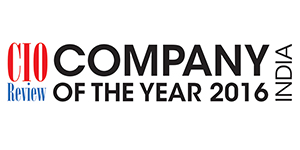 There lies an increasing need for innovative healthcare technology in India. New generations of system users who are comfortable with technology have encouraged advancements, and in fact, expect to have high quality technology solutions available in the workplace. This holds true in the medical field and a positive attitude change towards technology is doing the rounds amidst the ‘Digital India’ campaign.
There lies an increasing need for innovative healthcare technology in India. New generations of system users who are comfortable with technology have encouraged advancements, and in fact, expect to have high quality technology solutions available in the workplace. This holds true in the medical field and a positive attitude change towards technology is doing the rounds amidst the ‘Digital India’ campaign.Electronic Medical Records (EMRs) excel at capturing in-person encounters, but as care expands beyond those encounters, capturing and tracking what happens between patient visits has become of utmost importance. Moreover, enabling care teams to stay on the same page about a patient’s care plan, track action steps and reduce the friction of working together proves crucial to succeeding in a value-based world. For many years, Electronic Medical Records (EMRs) have been aimed at satisfying regulators and not just what clinicians want or need. That's changing, though, as solutions providers work towards making health records more appealing to end users on both sides of the doctor/patient relationship. Better mobile interfaces, for instance, are clearly desired by patients and physicians. Considering the budget cuts the healthcare industry has had to deal with over the past few years, every cost reduction is appreciated. And apparently cloud based EHR services are among the most recent EHR trends. EHRs on the cloud are less expensive for facilities to implement and update, since the constant expenditure on new hardware is eradicated.
Cloud based ambulatory EHR
Offering a cloud-based electronic medical record (EMR) solution, Massachusetts headquartered eClinicalWorks has realized success in India, with approximately 90 hospitals adopting the eClinicalWorks Hospital Management Information System (HMIS). These hospitals range from 50 to 2,000 beds multi-specialty hospitals as well as several that are focused on specialities such as vision, dental care, cardiology, and oncology. The Hospital Management Information System offers ward & bed management, emergency department services, care documentation, order management, medications, surgical theatre, diet & kitchen, Human Resources, payroll, and supply chain management. eClinicalWorks primarily targets physician practices and allows physicians to view and use as much or as little personal wellness data, with the patient's consent, as required for. The EHR is also interoperable with any hospital system that uses the Integrating the Healthcare Enterprise standards. eClinicalWorks is the leader among independent practices with an industry-leading 12 percent
market share.
Through high quality healthcare services, the cloud-based solution is an integral part of process management, patient care and the management information system (MIS) in hospitals. By improving accessibility, eClinicalWorks provides the tools to build and manage formulation. Thus, a physician can prescribe medications electronically, allowing the patient to pick up directly from the pharmacy of choice. Moreover, organizations can view patient dashboards displaying all clinical details, place orders via order sets, manage bed reservations, assignments, transfers, discharges, and establishes a single, holistic patient record.
The eClinicalWorks Cloud is the result of a carefully planned investment in cloud technology and infrastructure. While user adoption of EMRs is high, acceptance of cloud computing has been slower. The eClinicalWorks Cloud has been successful in overcoming many of the obstacles perceived by the medical profession for scalability, security, and performance. “We were pleased to have been recognized by Frost & Sullivan with the 2015 US Front & Sullivan Award for market leadership for capturing the highest market share among all cloud-based EHR vendors,” informs Aakash Shah, Director National and International Sales, eClinicalWorks. Along with a strong customer service orientation, the level of reliability, scalability, and security offered by the eCW Cloud, and competitive pricing has made eClinicalWorks a strong contender for cloud-based ambulatory EHR provider in terms of market share. Proving its capability, eClinicalWorks in 2015, secured USD 100 million in international business, including an agreement to provide cloud-based solutions for Specsavers, the U.K.-based eye-care service provider serving customers in more than a dozen nations.
EHR Suite
eClinicalWorks’ 10e, is the company’s core EMR product, covering every aspect of patient care, from online scheduling and Kiosk for check-in, through the medical encounter itself, labs, prescribing, billing, and follow-up care. The company puts the patient at the forefront of medical care. The system reduces the amount of duplicate data entry, medical errors, provides quality care to patients, and streamlines operational & administrative efficiencies.
eClinicalWorks provides hospitals with a highly functional and customizable customer portal and mobile application for patients. These tools bring added value to the patients and enhance the patient experience which improves the brand image of the hospital.
Also, the suite is a comprehensive solution, which has the functionality and interoperability needed to support a wide variety of traditional and non-traditional outpatient settings. eClinicalWorks is designed to be a unified solution that eliminates much of the redundancy and automates many administrative processes that were done by staff members but that did not contribute to the patient’s quality of care. Importantly, the patient experience of care improves because doctors have more time for face-to-face interaction rather than filling in forms. Staff members can also spend more time with patients because they do not have the burden of maintaining paper charts. The comprehensive solution integrates the various functions found in the inpatient environment, improving operational efficiency, streamlining workflows, and facilitating the delivery of high-quality patient care.
Taking Patient Privacy Regulation seriously
As a healthcare technology vendor, eClinicalWorks takes the responsibility for ensuring the safety of patient information. “Our goal always is to provide safe and secure technology to all our clients. As a company, all employees are trained in their responsibilities with respect to patient privacy and internal controls are implemented and monitored to ensure that our employees abide by company policies”, says Sameer Bhat, Vice President and Co-Founder, eClinicalWorks. The eClinicalWorks application has several features that help to ensure patient privacy and confidentiality is maintained. One of the features, eCW has multiple levels of authentication (username, password, biometric identification, token) that must be used to gain system access. Once in the system, access to the different areas of the application are controlled by security attributes that can give permission – or deny permission – to users, groups of users (role-based), and users at different facilities. Each organization can configure these permissions as per the principle of least privilege, ensuring that staff members have access to the information needed to perform the job. Secondly, eClinicalWorks maintains detailed audit logs of system activity, providing a way to audit user activity and ensure accountability. And thirdly, eClinicalWorks uses industry-standard encryption technology to protect data in transit so that data exchange between authorized providers, and between the practice and its patients, is secure.
Providers provide care, document their services, and code. A billing office gets charges entered and bills out the door. This is often followed by wait until responses from clearing-houses or payers in the form of rejections and denials are received. It’s a terribly inefficient process. Every step of the revenue cycle process begins with real-time patient eligibility checking, through automated claim creation using the data that is present in the clinical note, creating a clean claim, timely filing of the claim, and follow-up once the claim has been processed by the clearinghouse and the payer. In eClinicalWorks, claim scrubbing tools, clearinghouse dashboards, and robust reporting, all contribute to transparency, and ensure that claims do not ‘fall through the cracks’.
eClinicalWorks was founded in 1999 to help get rid of paper from a doctor’s office and make every single connection for the doctor; to the pharmacy, to the lab, and to the doctor’s supply chain. The intent was to digitize the communication and work flow between a physician’s office and the rest of healthcare to enable doctors to efficiently communicate with the world outside. Experience has positioned the company to redefine the possibilities and reshape the expectations of healthcare technology. “We are on a mission to make a change in healthcare by providing technology and services to reduce costs, reduce errors, and improve the quality of care”, adds Aakash. The company is working to create tools to bridge the gap between providers & patients, hospitals & private practices, and healthcare facilities & payers. eClinicalWorks’ unified cloud solutions allow organizations to work together to make health care faster, smarter, and more convenient.
With offices in U.S, London, India and Dubai, eClinicalWorks has demonstrated the presence and commitment required to work with existing and emerging healthcare systems in diverse cultures and regulatory environments. Also, the upsurge in the number of innovative healthcare technology tools and solutions encouraged eClinicalWorks to work towards a greater deployment of tools such as telemedicine, Hospital Information Systems (HIS) / HMIS, online or EMR.
eClinicalWorks strives to go beyond the immediate medical encounter itself, helping bring doctors and patients together for a comprehensive understanding of each individual’s health history, putting patient safety first, and keeping patients better engaged in meeting their own long-term needs.

eClinicalWorks uses industry-standard encryption technology to protect data in transit so that data exchange between authorized providers is secure
Taking Patient Privacy Regulation seriously
As a healthcare technology vendor, eClinicalWorks takes the responsibility for ensuring the safety of patient information. “Our goal always is to provide safe and secure technology to all our clients. As a company, all employees are trained in their responsibilities with respect to patient privacy and internal controls are implemented and monitored to ensure that our employees abide by company policies”, says Sameer Bhat, Vice President and Co-Founder, eClinicalWorks. The eClinicalWorks application has several features that help to ensure patient privacy and confidentiality is maintained. One of the features, eCW has multiple levels of authentication (username, password, biometric identification, token) that must be used to gain system access. Once in the system, access to the different areas of the application are controlled by security attributes that can give permission – or deny permission – to users, groups of users (role-based), and users at different facilities. Each organization can configure these permissions as per the principle of least privilege, ensuring that staff members have access to the information needed to perform the job. Secondly, eClinicalWorks maintains detailed audit logs of system activity, providing a way to audit user activity and ensure accountability. And thirdly, eClinicalWorks uses industry-standard encryption technology to protect data in transit so that data exchange between authorized providers, and between the practice and its patients, is secure.
Providers provide care, document their services, and code. A billing office gets charges entered and bills out the door. This is often followed by wait until responses from clearing-houses or payers in the form of rejections and denials are received. It’s a terribly inefficient process. Every step of the revenue cycle process begins with real-time patient eligibility checking, through automated claim creation using the data that is present in the clinical note, creating a clean claim, timely filing of the claim, and follow-up once the claim has been processed by the clearinghouse and the payer. In eClinicalWorks, claim scrubbing tools, clearinghouse dashboards, and robust reporting, all contribute to transparency, and ensure that claims do not ‘fall through the cracks’.
eClinicalWorks was founded in 1999 to help get rid of paper from a doctor’s office and make every single connection for the doctor; to the pharmacy, to the lab, and to the doctor’s supply chain. The intent was to digitize the communication and work flow between a physician’s office and the rest of healthcare to enable doctors to efficiently communicate with the world outside. Experience has positioned the company to redefine the possibilities and reshape the expectations of healthcare technology. “We are on a mission to make a change in healthcare by providing technology and services to reduce costs, reduce errors, and improve the quality of care”, adds Aakash. The company is working to create tools to bridge the gap between providers & patients, hospitals & private practices, and healthcare facilities & payers. eClinicalWorks’ unified cloud solutions allow organizations to work together to make health care faster, smarter, and more convenient.
With offices in U.S, London, India and Dubai, eClinicalWorks has demonstrated the presence and commitment required to work with existing and emerging healthcare systems in diverse cultures and regulatory environments. Also, the upsurge in the number of innovative healthcare technology tools and solutions encouraged eClinicalWorks to work towards a greater deployment of tools such as telemedicine, Hospital Information Systems (HIS) / HMIS, online or EMR.
eClinicalWorks strives to go beyond the immediate medical encounter itself, helping bring doctors and patients together for a comprehensive understanding of each individual’s health history, putting patient safety first, and keeping patients better engaged in meeting their own long-term needs.






